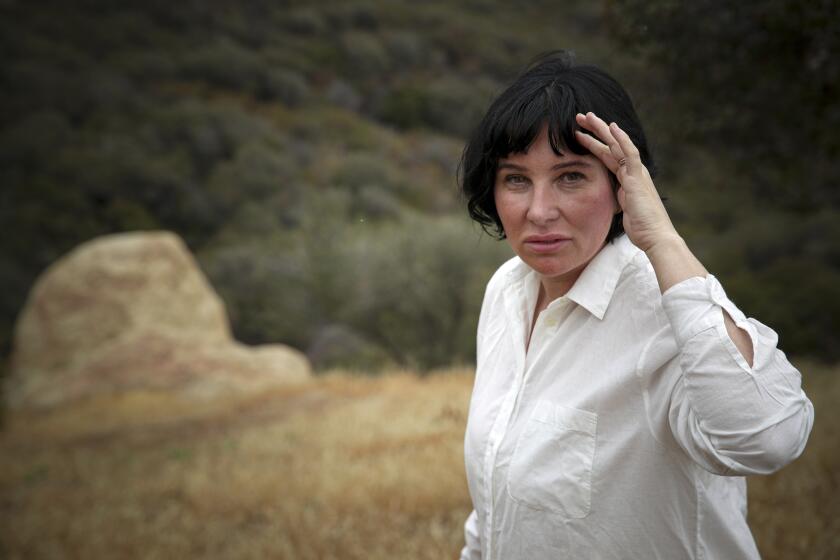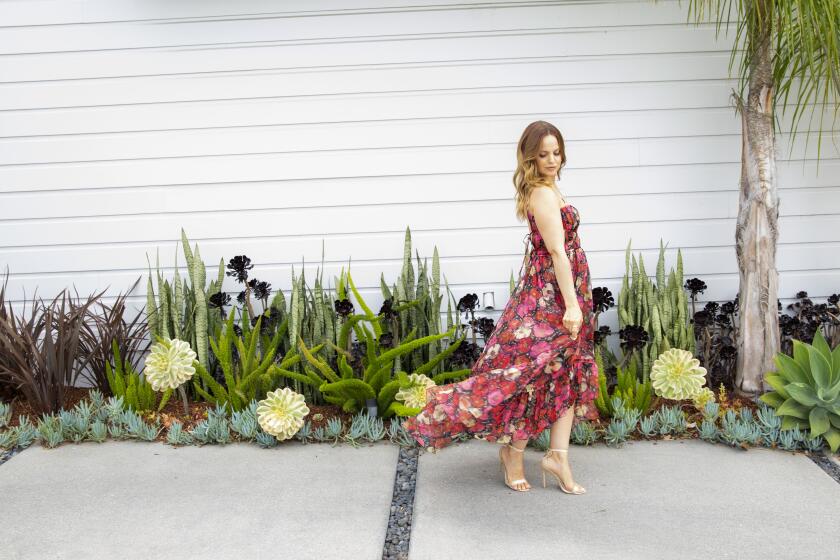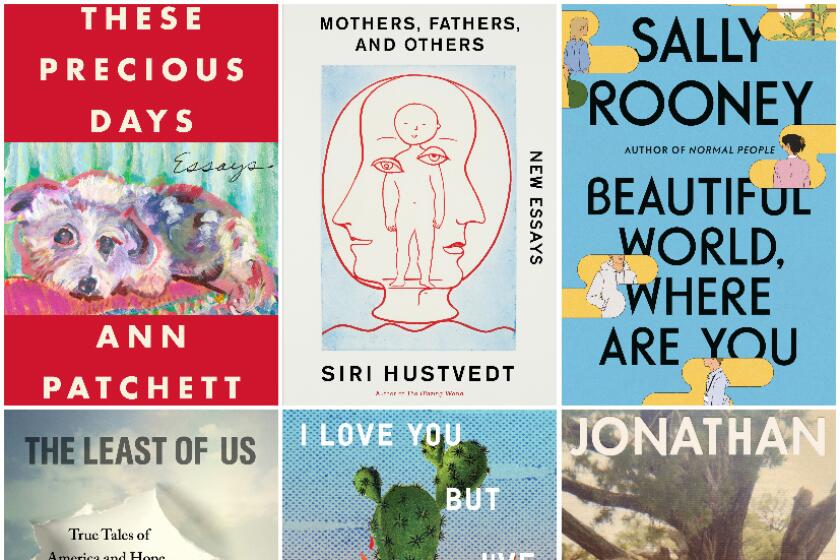Seeking a world without women, Tabitha Lasley lost herself â and found a better book
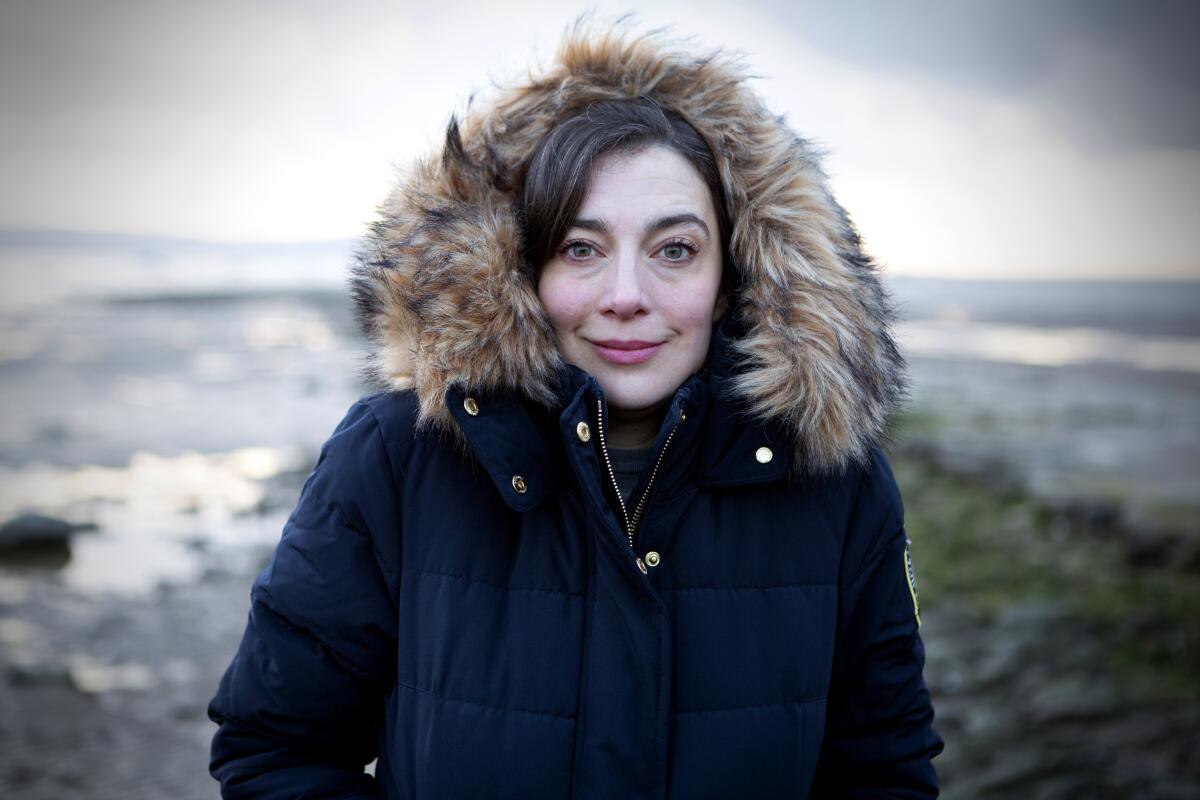
On the Shelf
Sea State: A Memoir
By Tabitha Lasley
Ecco: 176 pages, $28
If you buy books linked on our site, The Times may earn a commission from Bookshop.org, whose fees support independent bookstores.
On her second night in Scotland, Tabitha Lasley slept with one of her sources.
He was, in fact, the first person sheâd interviewed on her self-fashioned journalistic assignment. Sheâd traveled to Aberdeen in hopes of talking to offshore oil riggers like him â men who made their living on platforms in the North Sea, working for three months at a time hundreds of miles from land. She was hoping her research would get to some essential truth about gender: Without women around, how do men behave?
But then she met Caden. He was married, the father of twins, and stranded in the port city until the weather cleared enough for a chopper to drop him off on his rig. He invited Lasley out to a pub with some of his mates, stroked her hand and defended her when a drunk at the bar called her âa whore.â Then she invited him back to her hotel.
It was a twist of fate that would shift the course of âSea State,â the book Lasley ended up writing about her six-month stay in Aberdeen. What sheâd intended to be a purely journalistic endeavor became something else â an investigation-memoir hybrid, infused with the details of an affair that threatened to derail her both personally and professionally.
âI wasnât trained as a proper journalist, as you can probably tell,â says Lasley, now 40. âThe second agent I went to see said: âYou canât write this book if you want a career as a writer. You wonât be taken seriously.ââ
But ultimately, falling for one of the prototypical males she had sought to observe was what lifted her book beyond helicopter-journalist sociology and into the realm of a singular and refreshingly candid travel memoir. Not only did Lasley sign with the third agent she met with but when âSea Stateâ â out this week in the U.S. â was released nearly a year ago in the U.K., it received glowing notices. It was shortlisted for the Gordon Burn Prize, and the London Review of Books compared Lasley to Joan Didion, remarking on her skill for âinflecting non-fiction material subjectivelyâ and her âhabit of assessing situations via her nervous system.â
Lisa Taddeo, whose book âThree Womenâ broke the mold of immersive journalism, talks about her first novel, âAnimal,â and the struggle to write and live.
Some early reviews did take note of the authorâs untraditional reporting methods: taking drugs and drinking with her subjects, sometimes introducing herself under a fake name. Theyâre approaches Lasley says she âcanât pretend not to know arenât rightâ by the standards of professional journalism. But sheâs never been morally conflicted about it. The only real ethical responsibility she felt bound by, she says, was protecting her sources. (Cadenâs name and identifying details were changed.)
âThey look very, very dimly on people talking to journalists in the oil industry,â Lasley says from her home in Wirral, the English peninsula where she was raised and now lives. The sun is setting, and Lasley keeps picking up her laptop and moving to different spots, trying to find lighting that doesnât make her look âhideousâ on video chat. She grew up here, her mother a teacher and her father working in government pensions, in this town just across the Mersey from Liverpool.
Lasley moved to London in her 20s, getting a job first in advertising and then at a magazine that was distributed on a budget airline. The latter job allowed her to travel around Europe â Finland, Ibiza, Budapest â but the assignments werenât serious. âIt was, like, âThe Five Best Hotels in Accra,â that sort of stuff,â she recalls.
But she couldnât really write then anyway, she says.
âBecoming a writer was really an effort of will,â she explains. âBut I was so sure I was going to become a writer that I just made myself one. Iâve always been someone who pays a lot of account to signs and signals and magical thinking. Iâm a bit like a child. I think I can control the outcomes of things by wishing really hard for them.â
During her travels, one particular sign wouldnât let Lasley go. When she was 25, sheâd crossed paths with a couple of sailors on shore leave. They became friends, and their stories proved so interesting that she promised herself she would one day write a book about their lifestyle.
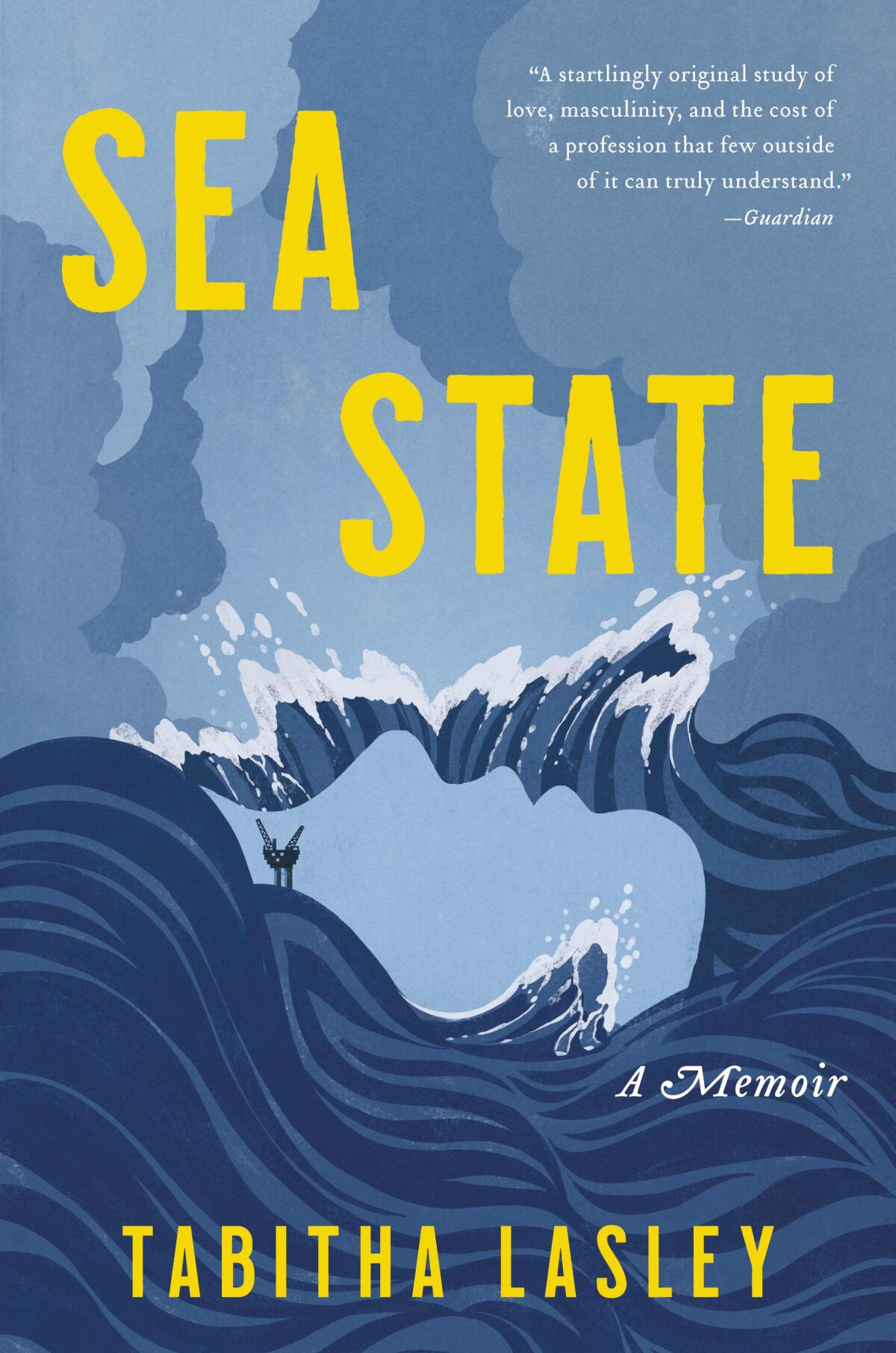
It would take a perverse sort of divine intervention for her to pursue the idea. In 2015, a burglar broke into Lasleyâs flat and stole her laptop. The computer contained a novel sheâd been working on for four years, and the draft had no other digital footprint. Taking it as another sign, she left her verbally abusive boyfriend of five years and decamped to Aberdeen to work on the nonfiction project sheâd mentally bookmarked.
Lasley didnât have much of a plan. âWhen I get there, the book will suddenly present itself to me,â she remembers thinking. She considered trying to actually work on a rig â where, she says, just 3% of the population is female â and took a safety induction and emergency training course to qualify for a job offshore. But when her affair started with Caden, she decided to get a six-month lease in Aberdeen instead.
Out with the essay collection âNo One Asked For This,â David talks candidly about nepotism, Pete Davidson and a terrifying, hilarious web of neuroses.
Their relationship was fast and furious. They met up at odd hours to have sex in hotel rooms and spent hours texting on WhatsApp when he was at work. Lasley and the rigger had met up only six times, she says, before he told her he was going to leave his wife for her. In retrospect, she can see why the âmeager profferâ of being with a married man appealed to her.
âThatâs why they tell people whoâve come out of abusive relationships, âDonât get into a relationship straight away.â Because youâre still vulnerable, and your boundaries are going to be skewed,â she says. âYour judgment is off, and you might end up getting into another sâ relationship.â
Lasley regained control by returning to what sheâd meant to do all along. As soon as the relationship began to fall apart, she started writing about it. Obsessing over Cadenâs whereabouts with no friends or prospects, she repaired to a Starbucks and started typing. Writing a history of their relationship, at least, felt productive.
âAnd when I looked up at the clock, I was like, âFâ-: Iâve written 2,000 words,ââ she recalls. âI was like, âOK. This is it. This is the book.ââ
Well, sort of. Though she understood Caden now had to become part of the narrative â âmaking a virtue out of a necessity,â in her words â she also had to acknowledge the three months she had wasted âfiddling around, having this affair, going out, taking drugs with these young lads and just having a good time.â
And she had to admit that the original project no longer interested her. While living on a transformer-esque structure in the middle of the ocean seemed fascinating, the day-to-day life was not. In their downtime, many of the men on the rigs spent hours scrolling mindlessly on their phones.
âMost people are garbage at being interviewed,â she says now. âWhen I spoke to the men, I was like: âThis is boring,ââ she adds with a slight smile. âTheyâve had really interesting things happen to them but they canât seem to tell it in interesting ways. Thatâs why I put more of myself in there, because I was like, âThis is more interesting.ââ
The âAmerican Beautyâ star discusses her memoir, âThe Great Peace,â and the abuse and shame she endured while seeming âtoo special to have problems.â
Lasley says she spoke to 103 male rig workers, though in âSea Stateâ she used their interviews to create 10 composite characters. Most of the guys she spoke to fit into one of two camps. There were the North Sea Tigers â the original generation who got into the business in the 1980s when the job was more lucrative. âThey were really old and cantankerous â the sorts that say, âHey, thatâs my seat in the TV room,ââ Lasley says.
The other set consisted of young men from Englandâs northeast, which Lasley compares to Americaâs Rust Belt. âTheyâre all young, buff, really into the gym, have lots of tats â sort of like some of the guys on âLove Island,ââ she says. âThey come home, take loads of coke, drink loads, have weird online affairs conducted on the phone and are obsessed with their appearance.â
That was Cadenâs camp, with a âstylized masculinity and peacocking that you would more associate with a woman.â His day rate was around ÂŁ700 â close to $1,000 â which Lasley says he spent on flashy things like a Range Rover and an expansive sneaker collection. For a while, his salary also caused Lasley to resent Cadenâs wife, a homemaker who took care of the coupleâs children.
âI looked at her and thought: âGod, sheâs got such an easy life compared to me, a childless woman in my 30s who works hard to pay my own bills. Whatâs she moaning about?ââ admits Lasley. âI thought she was a collaborator with this system of bondage. But looking back, it was more like I was, really. If youâre consorting with a man whoâs treating his wife badly, itâs a bit like crossing a picket line at a strike. I mean, go ahead and do it. But donât call yourself a feminist.â
Lasleyâs perspective deepened after she returned home to the Wirral to write. Back in England, she observed her sister raising two young kids and came to see it as the âhard option.â The experience strengthened her resolve not to âdenigrate the choices of other women.â (She finished âSea Stateâ in 2019 and has since revisited the stolen novel, set at a girls school on a marsh.)
But as for her grand takeaways about men? Suffice it to say that the whole experience contributed to her swearing off dating altogether â for now.
âIâm single, and I donât date,â she says without hesitation. âIs that shocking? Iâm 40 now, and I just sort of have no use for it anymore. I canât be bothered. Theyâre not worth the effort.â
Sally Rooney, Anthony Doerr, Maggie Nelson, Richard Powers, Jonathan Franzen â the list goes on. Four critics on kicking off a big, bookish fall.
More to Read
Sign up for our Book Club newsletter
Get the latest news, events and more from the Los Angeles Times Book Club, and help us get L.A. reading and talking.
You may occasionally receive promotional content from the Los Angeles Times.

